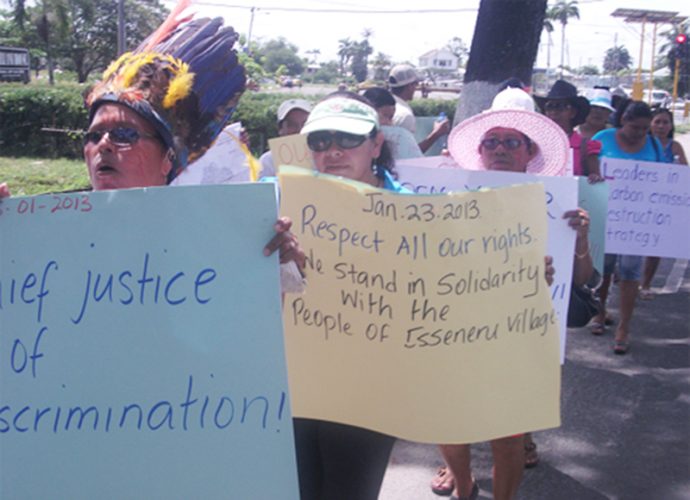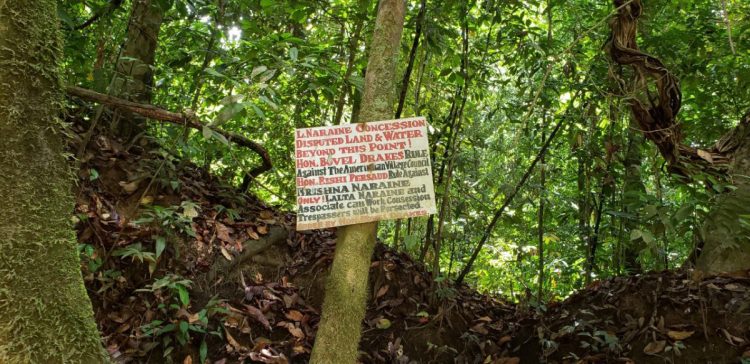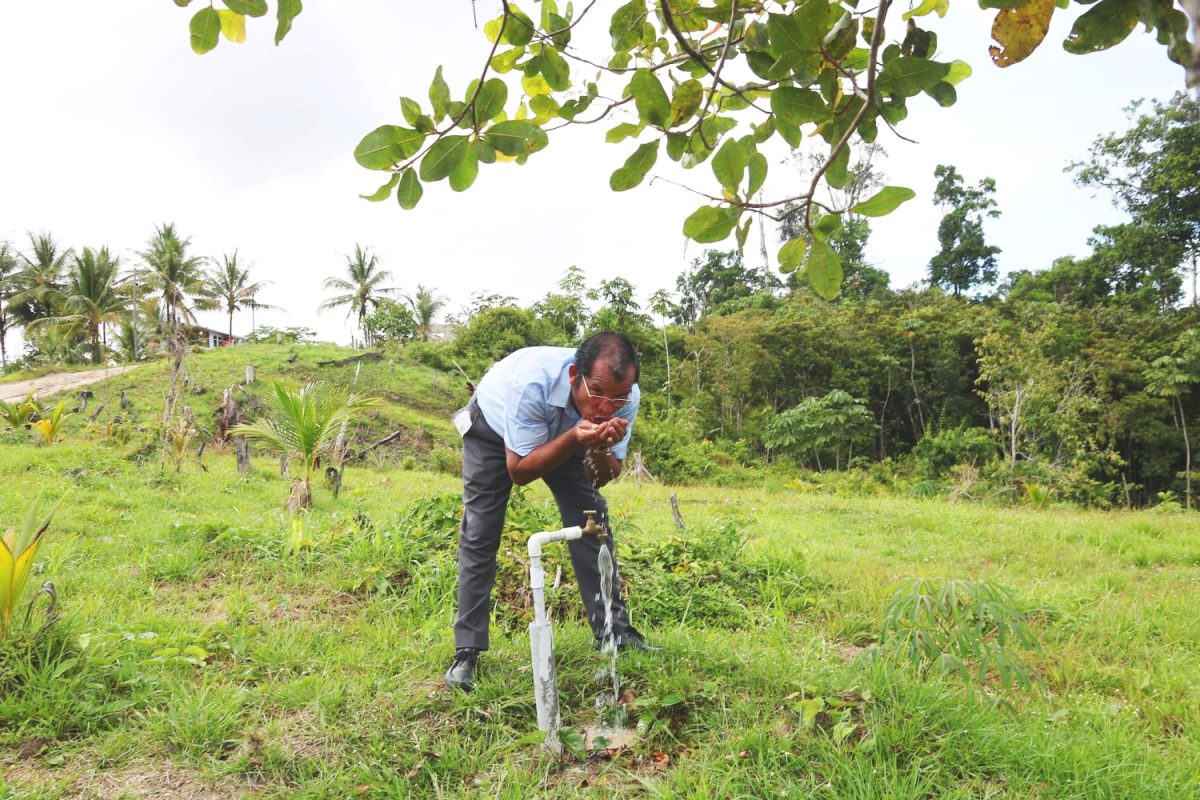-calls for reparations
The regional human rights body, IACHR has found that the State of Guyana is responsible for the violations of the rights of the Akawaios of Isseneru pertaining to collective territorial property, right to equality under the law and rights to health, food and water among other areas and has called for reparations.
In a report published on April 24th, 2024, the Inter-American Commission on Human Rights (IACHR) said On November 28, 2023, the Commission adopted Final Admissibi-lity and Merits Report No. 297/23 and issued its final conclusions and recommendations to the State. This was based on a petition to it from Isseneru and the Amerindian Peoples Association (APA) on September 5th, 2013. On December 6, 2023, the Commission transmitted the report to the State with a deadline of one month to inform it on the measures adopted to comply with its recommendations. On January 10, 2024, the IACHR said that the State of Guyana requested an extension of 3 months to submit its response. On February 1, 2024, the IACHR granted a 3-week extension. As of April 24th this year, the IACHR said it had not received a response from the State in relation to the report.

Isseneru and the APA had claimed violations to property, to equality before the law, to justice and a fair trial, to the protection of mothers and children, to the preservation of health and wellbeing, and to enjoy the benefits of culture, all of them protected by Articles II, VII, XI, XIII, XVIII and XXIII of the American Declaration on the Rights and Duties of Man (hereinafter the “American Declaration”), on account of the State’s alleged failure to adequately recognize, respect and protect the community’s territorial rights, its alleged granting of mining permits in the community’s ancestral lands without prior consultation or consent, its lack of protection of the community from the negative impacts of mining, and its alleged failure to provide the community with effective judicial remedies to counter the violations of their rights.
After lengthy engagements with Isseneru/APA and the State, the IACHR found that the state had violated the right to collective territorial property under Article XXIII of the American Declaration, insofar as the provisions of the Amerindian Act related to titling of ancestral indigenous territories (i) fail to recognize the preexistence of indigenous territorial rights, and visualize them as grants of State lands; (ii) do not establish a State obligation to grant indigenous communities or villages a property title to their ancestral territory; (iii) confer on the Minister of Amerindian Affairs an excessive degree of discretionary powers in the decision on whether to grant property title to indigenous communities, with no objective parameters or guidelines set forth in the legislation; (iv) fail to require the Minister to recognize the full extent of the ancestral territories of indigenous communities; and (v) do not admit the possibility of granting territorial property to indigenous peoples as a whole, which also affects their rights to participation and to the recognition of their legal personality.

The State of Guyana was also found to be in violation of the right to collective territorial property under Article XXIII of the American Declaration, because it has failed to grant Isseneru a property title over its entire ancestral territory, even though the community demonstrated that (i) it is a primarily Akawaio indigenous community, (ii) it is geographically set within Akawaio ancestral lands, (iii) the territory it claims corresponds to that of the ancestors and grandparents of its current members, (iv) it preserves a vital and spiritual link with that territory in its entirety, and (v) it needs the full extent of that territory to continue living in conformity with its economic, cultural and spiritual systems, and to pursue its livelihood and survival as an indigenous community. As the titling process over the entire territory is still unfinished, the IACHR report said that Guyana has also failed to properly delimit and demarcate those ancestral lands, thus incurring an additional violation of Article XXIII of the American Declaration.
Further, the State was also in breach of the rights to justice and due process under Articles XVIII and XXVI of the American Declaration, and the right to participation under Article XX thereof, because (i) the titling process took twenty years to complete and thereby incurred in an unjustified delay in its resolution; (ii) the community authorities and members went through legal uncertainty and insecurity as a result of the “overbroad” discretionary decision-making exercised by the Minister of Amerindian Affairs; (iii) the community was forced to acquiesce to a reduction in its legitimate claim to territory because of the Ministry’s unfounded assertions on the size of the requested lands; and (iv) the decision-making process was not participatory in nature.
The right to equality before the law under Article II of the American Declaration was also violated because Guyana has abstained from adopting the special positive measures required by Isseneru to gain prompt and secure access to legal property over its entire ancestral territory.
The IACHR also found the right to indigenous collective territorial property under Article XXIII of the American Declaration was violated by the State because its legal system, as reflected in its legislation, in the title deeds granted to Isseneru and in the decisions of its highest courts, has granted an ab initio priority and prevalence to the private property rights and economic interests of third parties over the protection of indigenous territorial property.
Restitution
The right to collective territorial property of Isseneru and other Amerindian communities under Article XXIII of the American Declaration was further transgressed by the state because its legislation lacks any provisions on restitution of the lands of which indigenous communities have been dispossessed and which they must reasonably recover in accordance with inter-American standards. In this connection, the IACHR ruled that Guyana has violated the right to equality before the law under Article II of the American Declaration, because the differential degree of protection granted to indigenous property when compared to the legal protection received by private non-indigenous property entails a situation of racial discrimination.
In a declaration that could have broader implications, the IACHR said that the State was also in violation of the right to indigenous collective territorial property under Article XXIII of the American Declaration, and the right to participation under Article XX thereof, insofar as the provisions of its Mining Act fail to properly incorporate the human rights guarantee of prior consultation in cases of small- and medium-scale mining projects and also because they have incorporated insufficient guarantees for the Amerindian communities’ right to participate in the benefits of extractive operations in indigenous territories.
“The right to indigenous collective territorial property, and the interconnected rights to health, food, water, a healthy environment and cultural integrity, insofar as the provisions of its Mining Code deny indigenous communities and peoples the right to free and informed consent in cases of large-scale mining projects that threaten their survival” has also been violated by the state, the IACHR found.
The State was also found in breach of the right to indigenous collective territorial property, and the interconnected rights to health, water, food, cultural integrity and a healthy environment, insofar as in relation to Isseneru it has failed to properly implement its legislation requiring the conducting of prior environmental social and impact assessments before the initiation of any mining operation in indigenous territories.
The right to equality before the law has also been breached by the State because its legislation establishes differential treatment between indigenous communities, who are the holders of custom-based ancestral rights over their territories, and private owners whose title to property was issued before 1903, given that the latter are recognized property over the subsoil resources, which Amerindian communities are denied, the IACHR stated.
Also violated by the State was the right to indigenous collective territorial property of the Isseneru community and its members, because the mining operations developed by Lalta Narine and Joan Chang were not the subject of prior consultations, socio-environmental impact assessments, or reasonable benefit-sharing mechanisms before they began implementation.
Interconnected
The right to collective territorial property, and its interconnected rights to health, food, water, a healthy environment and cultural integrity, were also transgressed because in relation to the untitled lands within Isseneru’s ancestral territory the State has granted mining permits which have not been consulted, assessed in their environmental and social impacts, nor been the matter of reasonable benefit sharing. Moreover, the Isseneru community’s right to territorial property has been disregarded because it is legally powerless in relation to its untitled lands under Guyanese law. The IACHR highlighted that, if any permits, concessions or licenses are issued for mining, forestry or any other extractive activity within the untitled parts of Isseneru’s ancestral territory, before said territory is duly titled, demarcated and delimited in its full extent, the State of Guyana would incur in a violation of international law, in particular of the right to collective property under Article XXIII of the American Declaration.
The right to indigenous collective territorial property, and the interconnected rights to health, water, food, a healthy environment and cultural integrity were breached by the state because Guyana failed to act promptly in relation to the severe instances of environmental degradation and destruction caused by mining operations within Isseneru’s ancestral territory, including but not restricted to the operations of Narine and Chang, inasmuch as it refrained from halting the projects, restoring the damaged environment to the highest attainable degree, and sanctioning the private parties responsible for the harm. In particular, in relation to the pollution of rivers and creeks with mercury, the IACHR said it considers that the rights of especially vulnerable populations such as children, pregnant women and elderly persons were violated, thus also disregarding Article VII of the American Declaration.
The report did note that in relation to the right to water, in November 2022, the IACHR learned from a public information source that the residents of Isseneru (500 inhabitants) had access to drinking water for the first time, through the water supply system commissioned by the Ministry of Housing and Water. The Commission said it positively values that the State is fulfilling its obligation to provide water to the community.
The right to health was also contravened insofar as the State has not adequately guaranteed access to sufficient and culturally acceptable healthcare by those persons who have been negatively affected by mercury contamination and other forms of pollution and environmental degradation in their ancestral territory, contrary to Articles I, VII and XI of the American Declaration.
The rights to collective territorial property and to equality before the law of the Isseneru community and its members have also bene infringed because the Guyanese High Court granted full, absolute and a priori protection to the private economic interests of Narine and Chang, equating those private interests to private property rights and granting them priority and prevalence over the territorial rights of a vulnerable Amerindian group.
Finally, the rights to justice and due process of law were flouted because the Isseneru community and its members had no access to effective remedies in order to seek the protection of their territorial rights from the destructive impacts of the mining activities developed in their ancestral lands.
Comprehensive
As a result, the IACHR called on the State of Guyana to adopt the necessary measures so that the Isseneru community and its members receive “comprehensive reparations for the material and non-material damages they suffered due to the violation of their human rights”. Such reparations should include compensation, satisfaction and any other measures that may be appropriate in accordance with Inter-American standards, including the provision of the required health services to the members of the community affected by the environmental contamination.
The State was also called upon to amend its legislation in order to ensure that the provisions of laws and regulations related to indigenous territorial property are in harmony with the American Declaration.
With full respect for the Isseneru community’s right to autonomy and free management of its natural resources, the State was called upon to adopt the necessary measures to support Isseneru and its members in the due fulfillment of their own duty to preserve and protect the environment, particularly in relation to the mining operations that they themselves carry out in their ancestral territory.
In a statement yesterday, the Isseneru Village Council said: “We wish to express our gratitude to the Inter-American Commission on Human Rights for their thorough investigation and commitment to upholding human rights, particularly those of indigenous peoples. The report not only validates our concerns but also provides important recommendations for addressing the issues we face.
“As the Isseneru Village Council, we remain committed to engaging constructively with the government and other stakeholders to find solutions that respect our rights and protect our land and resources. We believe that dialogue and cooperation are essential in addressing the root causes of the issues highlighted in the report and ensuring a better future for our community.
“We call upon the government to heed the IACHR’s recommendations and work collaboratively with us to implement measures that will safeguard our rights and promote sustainable development in our territory. We have since reached out to the Minister of Parliamentary Affairs and Governance, Honourable Gail Teixeira requesting a meeting to determine the way forward”.
Pursuant to Article 17.2 of the IACHR’s Rules of Procedure, the report said Commissioner Arif Bulkan, a Guyanese national, did not participate in the debate or decision in this case. That article among other things says that members of the Commission may not participate in the discussion, investigation, deliberation or decision of a matter submitted to the Commission if they are nationals of the State which is the subject of the Commission’s general or specific review.
The IACHR ruling is the latest from a regional or UN rights body addressing the violation of the rights of indigenous communities.









